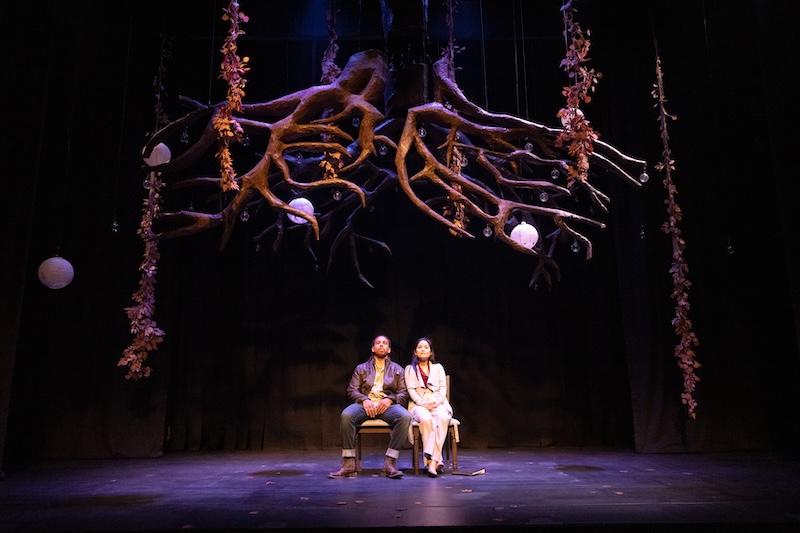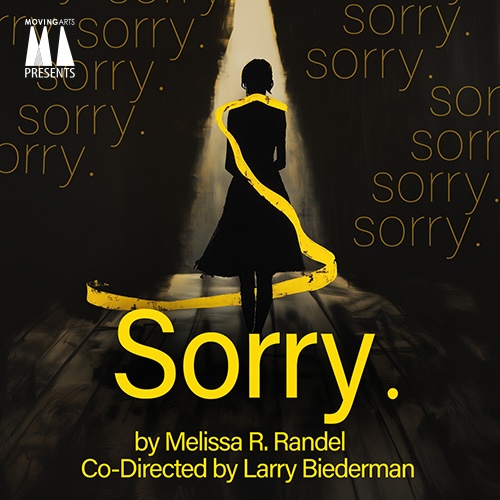
Gerard Joseph and Sylvia Kwan (Photo by Jenny Graham)
Reviewed by F. Kathleen Foley
East West Players
Through April 28
Kairos, now in its final week at East West Players, hinges on a spectacular premise. Prometheus, a new technology derived, oddly, from the slime of snails, conveys immortality upon those who receive it. The catch? Only those under 35 are eligible.
The vast moral, social, and ethical repercussions of the procedure are obvious, especially since snail slime is in short supply and potential recipients are chosen by lottery before being carefully vetted by committee – the ultimate arbiters of who will live and who will die.
Call Kairos a provocative parable about ageism. Unfortunately, despite the many opportunities it presents, the play — a rolling world premiere by Lisa Sanye Dring — gives short shrift to the deeper philosophical issues that could have lent more substance to the proceedings.
Granted, Dring’s main concern is personal rather than philosophical — namely, the effect of Prometheus on Gina (Sylvia Kwan) and David (Gerard Joseph), who are ready to commit to a life together. When David wins the lottery, but Gina loses out, his decision about whether or not to undergo the procedure could be a dealbreaker for them.
It’s here that Dring’s play gets muzzy. The committee has decreed that legal spouses can join their mates in immortality. Evidently, a legally recognized marriage is all it takes — but wouldn’t such an exception trigger an avalanche of “green card,” Tinder-based marriages? By that metric, anyone under 35 could potentially receive the procedure, so long as they were willing to get hitched, pronto.
The list of unrealized opportunities goes on. A “meet cute” opening scene has David and Gina exchanging strained “comical” banter, during which David casually comments that he is bisexual. That disclosure, which remains undeveloped in any authentic dramatic sense, seems a truckling concession to hipness rather than a believable character trait.
At another point, Gina and David — both people of color — fret that a racist committee may stack the deck in favor of whites. That intriguing and timely plot point is quickly dropped as Dring leads us down another dead end.
The chronology also confuses. Gina and David appear to have already become immortal before we realize that they must still undergo the vetting process. Also, David’s irritatingly protracted grief following the death of his estranged and detested father seems a very thin motive for his reconsideration of getting the procedure — a fatal reversal that Gina considers nothing less than “murder.” Why would David behave with such cavalier dismissiveness when Gina’s life is at stake? At this point, we lose all patience with this previously sympathetic character.
Most problematic is the sheeplike behavior of society at large. Apparently, most accept the committee’s fiat with surprising (and unmotivated) docility. Are there no rabble-rousers inciting the populace to open violence and unrest?
Among the assured design elements, the most impressive is Yi-Chien Lee’s spectacular set, one of the most unusual in memory, with its huge ceiling of twisting tree limbs — a nod to the Tree of Life as a connection to the afterlife. As evidenced by the title, Dring laces her play with allusions to Greek mythology — an effective rhetorical device that allows David, a professor in the field, to examine the spectrum of human history — a history that is about to be forever upended.
Director Jesca Prudencio and an able cast, which includes Ren Hanami and William L. Warren as the older versions of Gina and David, inject considerable vitality and humor into Dring’s potentially fascinating but failed play, which ultimately bites off more than it can chew.
East West Players, David Henry Hwang Theater, 120 Judge John Aiso Street, downtown LA. Thurs.-Fri. and Mon., 8 pm, Sat., 2 and 8 pm, Sun., 5 pm; thru April 28. Masks required at all Sat. matinees. (213) 625-7000. www.eastwestplayers.org Running time: 85 minutes with no intermission.















